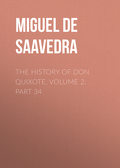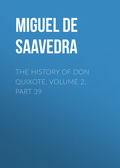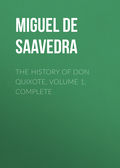
Мигель де Сервантес Сааведра
Don Quixote
"For all that it is there, without any manner of doubt," said Don Quixote; "and more by token they say it is inclosed in a sheath of cowhide to keep it from rusting."
"All that may be," replied the canon; "but, by the orders I have received, I do not remember seeing it. However, granting it is there, that is no reason why I am bound to believe the stories of all those Amadises and of all that multitude of knights they tell us about, nor is it reasonable that a man like your worship, so worthy, and with so many good qualities, and endowed with such a good understanding, should allow himself to be persuaded that such wild crazy things as are written in those absurd books of chivalry are really true."
CHAPTER L.
OF THE SHREWD CONTROVERSY WHICH DON QUIXOTE AND THE CANON HELD, TOGETHER WITH OTHER INCIDENTS
"A good joke, that!" returned Don Quixote. "Books that have been printed with the king's licence, and with the approbation of those to whom they have been submitted, and read with universal delight, and extolled by great and small, rich and poor, learned and ignorant, gentle and simple, in a word by people of every sort, of whatever rank or condition they may be – that these should be lies! And above all when they carry such an appearance of truth with them; for they tell us the father, mother, country, kindred, age, place, and the achievements, step by step, and day by day, performed by such a knight or knights! Hush, sir; utter not such blasphemy; trust me I am advising you now to act as a sensible man should; only read them, and you will see the pleasure you will derive from them. For, come, tell me, can there be anything more delightful than to see, as it were, here now displayed before us a vast lake of bubbling pitch with a host of snakes and serpents and lizards, and ferocious and terrible creatures of all sorts swimming about in it, while from the middle of the lake there comes a plaintive voice saying: 'Knight, whosoever thou art who beholdest this dread lake, if thou wouldst win the prize that lies hidden beneath these dusky waves, prove the valour of thy stout heart and cast thyself into the midst of its dark burning waters, else thou shalt not be worthy to see the mighty wonders contained in the seven castles of the seven Fays that lie beneath this black expanse;' and then the knight, almost ere the awful voice has ceased, without stopping to consider, without pausing to reflect upon the danger to which he is exposing himself, without even relieving himself of the weight of his massive armour, commending himself to God and to his lady, plunges into the midst of the boiling lake, and when he little looks for it, or knows what his fate is to be, he finds himself among flowery meadows, with which the Elysian fields are not to be compared.
"The sky seems more transparent there, and the sun shines with a strange brilliancy, and a delightful grove of green leafy trees presents itself to the eyes and charms the sight with its verdure, while the ear is soothed by the sweet untutored melody of the countless birds of gay plumage that flit to and fro among the interlacing branches. Here he sees a brook whose limpid waters, like liquid crystal, ripple over fine sands and white pebbles that look like sifted gold and purest pearls. There he perceives a cunningly wrought fountain of many-coloured jasper and polished marble; here another of rustic fashion where the little mussel-shells and the spiral white and yellow mansions of the snail disposed in studious disorder, mingled with fragments of glittering crystal and mock emeralds, make up a work of varied aspect, where art, imitating nature, seems to have outdone it.
"Suddenly there is presented to his sight a strong castle or gorgeous palace with walls of massy gold, turrets of diamond and gates of jacinth; in short, so marvellous is its structure that though the materials of which it is built are nothing less than diamonds, carbuncles, rubies, pearls, gold, and emeralds, the workmanship is still more rare. And after having seen all this, what can be more charming than to see how a bevy of damsels comes forth from the gate of the castle in gay and gorgeous attire, such that, were I to set myself now to depict it as the histories describe it to us, I should never have done; and then how she who seems to be the first among them all takes the bold knight who plunged into the boiling lake by the hand, and without addressing a word to him leads him into the rich palace or castle, and strips him as naked as when his mother bore him, and bathes him in lukewarm water, and anoints him all over with sweet-smelling unguents, and clothes him in a shirt of the softest sendal, all scented and perfumed, while another damsel comes and throws over his shoulders a mantle which is said to be worth at the very least a city, and even more? How charming it is, then, when they tell us how, after all this, they lead him to another chamber where he finds the tables set out in such style that he is filled with amazement and wonder; to see how they pour out water for his hands distilled from amber and sweet-scented flowers; how they seat him on an ivory chair; to see how the damsels wait on him all in profound silence; how they bring him such a variety of dainties so temptingly prepared that the appetite is at a loss which to select; to hear the music that resounds while he is at table, by whom or whence produced he knows not. And then when the repast is over and the tables removed, for the knight to recline in the chair, picking his teeth perhaps as usual, and a damsel, much lovelier than any of the others, to enter unexpectedly by the chamber door, and herself by his side, and begin to tell him what the castle is, and how she is held enchanted there, and other things that amaze the knight and astonish the readers who are perusing his history.
"But I will not expatiate any further upon this, as it may be gathered from it that whatever part of whatever history of a knight-errant one reads, it will fill the reader, whoever he be, with delight and wonder; and take my advice, sir, and, as I said before, read these books and you will see how they will banish any melancholy you may feel and raise your spirits should they be depressed. For myself I can say that since I have been a knight-errant I have become valiant, polite, generous, well-bred, magnanimous, courteous, dauntless, gentle, patient, and have learned to bear hardships, imprisonments, and enchantments; and though it be such a short time since I have seen myself shut up in a cage like a madman, I hope by the might of my arm, if heaven aid me and fortune thwart me not, to see myself king of some kingdom where I may be able to show the gratitude and generosity that dwell in my heart; for by my faith, senor, the poor man is incapacitated from showing the virtue of generosity to anyone, though he may possess it in the highest degree; and gratitude that consists of disposition only is a dead thing, just as faith without works is dead. For this reason I should be glad were fortune soon to offer me some opportunity of making myself an emperor, so as to show my heart in doing good to my friends, particularly to this poor Sancho Panza, my squire, who is the best fellow in the world; and I would gladly give him a county I have promised him this ever so long, only that I am afraid he has not the capacity to govern his realm."
Sancho partly heard these last words of his master, and said to him, "Strive hard you, Senor Don Quixote, to give me that county so often promised by you and so long looked for by me, for I promise you there will be no want of capacity in me to govern it; and even if there is, I have heard say there are men in the world who farm seigniories, paying so much a year, and they themselves taking charge of the government, while the lord, with his legs stretched out, enjoys the revenue they pay him, without troubling himself about anything else. That's what I'll do, and not stand haggling over trifles, but wash my hands at once of the whole business, and enjoy my rents like a duke, and let things go their own way."
"That, brother Sancho," said the canon, "only holds good as far as the enjoyment of the revenue goes; but the lord of the seigniory must attend to the administration of justice, and here capacity and sound judgment come in, and above all a firm determination to find out the truth; for if this be wanting in the beginning, the middle and the end will always go wrong; and God as commonly aids the honest intentions of the simple as he frustrates the evil designs of the crafty."
"I don't understand those philosophies," returned Sancho Panza; "all I know is I would I had the county as soon as I shall know how to govern it; for I have as much soul as another, and as much body as anyone, and I shall be as much king of my realm as any other of his; and being so I should do as I liked, and doing as I liked I should please myself, and pleasing myself I should be content, and when one is content he has nothing more to desire, and when one has nothing more to desire there is an end of it; so let the county come, and God be with you, and let us see one another, as one blind man said to the other."
"That is not bad philosophy thou art talking, Sancho," said the canon; "but for all that there is a good deal to be said on this matter of counties."
To which Don Quixote returned, "I know not what more there is to be said; I only guide myself by the example set me by the great Amadis of Gaul, when he made his squire count of the Insula Firme; and so, without any scruples of conscience, I can make a count of Sancho Panza, for he is one of the best squires that ever knight-errant had."
The canon was astonished at the methodical nonsense (if nonsense be capable of method) that Don Quixote uttered, at the way in which he had described the adventure of the knight of the lake, at the impression that the deliberate lies of the books he read had made upon him, and lastly he marvelled at the simplicity of Sancho, who desired so eagerly to obtain the county his master had promised him.
By this time the canon's servants, who had gone to the inn to fetch the sumpter mule, had returned, and making a carpet and the green grass of the meadow serve as a table, they seated themselves in the shade of some trees and made their repast there, that the carter might not be deprived of the advantage of the spot, as has been already said. As they were eating they suddenly heard a loud noise and the sound of a bell that seemed to come from among some brambles and thick bushes that were close by, and the same instant they observed a beautiful goat, spotted all over black, white, and brown, spring out of the thicket with a goatherd after it, calling to it and uttering the usual cries to make it stop or turn back to the fold. The fugitive goat, scared and frightened, ran towards the company as if seeking their protection and then stood still, and the goatherd coming up seized it by the horns and began to talk to it as if it were possessed of reason and understanding: "Ah wanderer, wanderer, Spotty, Spotty; how have you gone limping all this time? What wolves have frightened you, my daughter? Won't you tell me what is the matter, my beauty? But what else can it be except that you are a she, and cannot keep quiet? A plague on your humours and the humours of those you take after! Come back, come back, my darling; and if you will not be so happy, at any rate you will be safe in the fold or with your companions; for if you who ought to keep and lead them, go wandering astray, what will become of them?"
The goatherd's talk amused all who heard it, but especially the canon, who said to him, "As you live, brother, take it easy, and be not in such a hurry to drive this goat back to the fold; for, being a female, as you say, she will follow her natural instinct in spite of all you can do to prevent it. Take this morsel and drink a sup, and that will soothe your irritation, and in the meantime the goat will rest herself," and so saying, he handed him the loins of a cold rabbit on a fork.
The goatherd took it with thanks, and drank and calmed himself, and then said, "I should be sorry if your worships were to take me for a simpleton for having spoken so seriously as I did to this animal; but the truth is there is a certain mystery in the words I used. I am a clown, but not so much of one but that I know how to behave to men and to beasts."
"That I can well believe," said the curate, "for I know already by experience that the woods breed men of learning, and shepherds' harbour philosophers."
"At all events, senor," returned the goatherd, "they shelter men of experience; and that you may see the truth of this and grasp it, though I may seem to put myself forward without being asked, I will, if it will not tire you, gentlemen, and you will give me your attention for a little, tell you a true story which will confirm this gentleman's word (and he pointed to the curate) as well as my own."
To this Don Quixote replied, "Seeing that this affair has a certain colour of chivalry about it, I for my part, brother, will hear you most gladly, and so will all these gentlemen, from the high intelligence they possess and their love of curious novelties that interest, charm, and entertain the mind, as I feel quite sure your story will do. So begin, friend, for we are all prepared to listen."
"I draw my stakes," said Sancho, "and will retreat with this pasty to the brook there, where I mean to victual myself for three days; for I have heard my lord, Don Quixote, say that a knight-errant's squire should eat until he can hold no more, whenever he has the chance, because it often happens them to get by accident into a wood so thick that they cannot find a way out of it for six days; and if the man is not well filled or his alforjas well stored, there he may stay, as very often he does, turned into a dried mummy."
"Thou art in the right of it, Sancho," said Don Quixote; "go where thou wilt and eat all thou canst, for I have had enough, and only want to give my mind its refreshment, as I shall by listening to this good fellow's story."
"It is what we shall all do," said the canon; and then begged the goatherd to begin the promised tale.
The goatherd gave the goat which he held by the horns a couple of slaps on the back, saying, "Lie down here beside me, Spotty, for we have time enough to return to our fold." The goat seemed to understand him, for as her master seated himself, she stretched herself quietly beside him and looked up in his face to show him she was all attention to what he was going to say, and then in these words he began his story.
CHAPTER LI.
WHICH DEALS WITH WHAT THE GOATHERD TOLD THOSE WHO WERE CARRYING OFF DON QUIXOTE
Three leagues from this valley there is a village which, though small, is one of the richest in all this neighbourhood, and in it there lived a farmer, a very worthy man, and so much respected that, although to be so is the natural consequence of being rich, he was even more respected for his virtue than for the wealth he had acquired. But what made him still more fortunate, as he said himself, was having a daughter of such exceeding beauty, rare intelligence, gracefulness, and virtue, that everyone who knew her and beheld her marvelled at the extraordinary gifts with which heaven and nature had endowed her. As a child she was beautiful, she continued to grow in beauty, and at the age of sixteen she was most lovely. The fame of her beauty began to spread abroad through all the villages around – but why do I say the villages around, merely, when it spread to distant cities, and even made its way into the halls of royalty and reached the ears of people of every class, who came from all sides to see her as if to see something rare and curious, or some wonder-working image?
Her father watched over her and she watched over herself; for there are no locks, or guards, or bolts that can protect a young girl better than her own modesty. The wealth of the father and the beauty of the daughter led many neighbours as well as strangers to seek her for a wife; but he, as one might well be who had the disposal of so rich a jewel, was perplexed and unable to make up his mind to which of her countless suitors he should entrust her. I was one among the many who felt a desire so natural, and, as her father knew who I was, and I was of the same town, of pure blood, in the bloom of life, and very rich in possessions, I had great hopes of success. There was another of the same place and qualifications who also sought her, and this made her father's choice hang in the balance, for he felt that on either of us his daughter would be well bestowed; so to escape from this state of perplexity he resolved to refer the matter to Leandra (for that is the name of the rich damsel who has reduced me to misery), reflecting that as we were both equal it would be best to leave it to his dear daughter to choose according to her inclination – a course that is worthy of imitation by all fathers who wish to settle their children in life. I do not mean that they ought to leave them to make a choice of what is contemptible and bad, but that they should place before them what is good and then allow them to make a good choice as they please. I do not know which Leandra chose; I only know her father put us both off with the tender age of his daughter and vague words that neither bound him nor dismissed us. My rival is called Anselmo and I myself Eugenio – that you may know the names of the personages that figure in this tragedy, the end of which is still in suspense, though it is plain to see it must be disastrous.
About this time there arrived in our town one Vicente de la Roca, the son of a poor peasant of the same town, the said Vicente having returned from service as a soldier in Italy and divers other parts. A captain who chanced to pass that way with his company had carried him off from our village when he was a boy of about twelve years, and now twelve years later the young man came back in a soldier's uniform, arrayed in a thousand colours, and all over glass trinkets and fine steel chains. To-day he would appear in one gay dress, to-morrow in another; but all flimsy and gaudy, of little substance and less worth. The peasant folk, who are naturally malicious, and when they have nothing to do can be malice itself, remarked all this, and took note of his finery and jewellery, piece by piece, and discovered that he had three suits of different colours, with garters and stockings to match; but he made so many arrangements and combinations out of them, that if they had not counted them, anyone would have sworn that he had made a display of more than ten suits of clothes and twenty plumes. Do not look upon all this that I am telling you about the clothes as uncalled for or spun out, for they have a great deal to do with the story. He used to seat himself on a bench under the great poplar in our plaza, and there he would keep us all hanging open-mouthed on the stories he told us of his exploits. There was no country on the face of the globe he had not seen, nor battle he had not been engaged in; he had killed more Moors than there are in Morocco and Tunis, and fought more single combats, according to his own account, than Garcilaso, Diego Garcia de Paredes and a thousand others he named, and out of all he had come victorious without losing a drop of blood. On the other hand he showed marks of wounds, which, though they could not be made out, he said were gunshot wounds received in divers encounters and actions. Lastly, with monstrous impudence he used to say "you" to his equals and even those who knew what he was, and declare that his arm was his father and his deeds his pedigree, and that being a soldier he was as good as the king himself. And to add to these swaggering ways he was a trifle of a musician, and played the guitar with such a flourish that some said he made it speak; nor did his accomplishments end here, for he was something of a poet too, and on every trifle that happened in the town he made a ballad a league long.
This soldier, then, that I have described, this Vicente de la Roca, this bravo, gallant, musician, poet, was often seen and watched by Leandra from a window of her house which looked out on the plaza. The glitter of his showy attire took her fancy, his ballads bewitched her (for he gave away twenty copies of every one he made), the tales of his exploits which he told about himself came to her ears; and in short, as the devil no doubt had arranged it, she fell in love with him before the presumption of making love to her had suggested itself to him; and as in love-affairs none are more easily brought to an issue than those which have the inclination of the lady for an ally, Leandra and Vicente came to an understanding without any difficulty; and before any of her numerous suitors had any suspicion of her design, she had already carried it into effect, having left the house of her dearly beloved father (for mother she had none), and disappeared from the village with the soldier, who came more triumphantly out of this enterprise than out of any of the large number he laid claim to. All the village and all who heard of it were amazed at the affair; I was aghast, Anselmo thunderstruck, her father full of grief, her relations indignant, the authorities all in a ferment, the officers of the Brotherhood in arms. They scoured the roads, they searched the woods and all quarters, and at the end of three days they found the flighty Leandra in a mountain cave, stript to her shift, and robbed of all the money and precious jewels she had carried away from home with her.
They brought her back to her unhappy father, and questioned her as to her misfortune, and she confessed without pressure that Vicente de la Roca had deceived her, and under promise of marrying her had induced her to leave her father's house, as he meant to take her to the richest and most delightful city in the whole world, which was Naples; and that she, ill-advised and deluded, had believed him, and robbed her father, and handed over all to him the night she disappeared; and that he had carried her away to a rugged mountain and shut her up in the eave where they had found her. She said, moreover, that the soldier, without robbing her of her honour, had taken from her everything she had, and made off, leaving her in the cave, a thing that still further surprised everybody. It was not easy for us to credit the young man's continence, but she asserted it with such earnestness that it helped to console her distressed father, who thought nothing of what had been taken since the jewel that once lost can never be recovered had been left to his daughter. The same day that Leandra made her appearance her father removed her from our sight and took her away to shut her up in a convent in a town near this, in the hope that time may wear away some of the disgrace she has incurred. Leandra's youth furnished an excuse for her fault, at least with those to whom it was of no consequence whether she was good or bad; but those who knew her shrewdness and intelligence did not attribute her misdemeanour to ignorance but to wantonness and the natural disposition of women, which is for the most part flighty and ill-regulated.
Leandra withdrawn from sight, Anselmo's eyes grew blind, or at any rate found nothing to look at that gave them any pleasure, and mine were in darkness without a ray of light to direct them to anything enjoyable while Leandra was away. Our melancholy grew greater, our patience grew less; we cursed the soldier's finery and railed at the carelessness of Leandra's father. At last Anselmo and I agreed to leave the village and come to this valley; and, he feeding a great flock of sheep of his own, and I a large herd of goats of mine, we pass our life among the trees, giving vent to our sorrows, together singing the fair Leandra's praises, or upbraiding her, or else sighing alone, and to heaven pouring forth our complaints in solitude. Following our example, many more of Leandra's lovers have come to these rude mountains and adopted our mode of life, and they are so numerous that one would fancy the place had been turned into the pastoral Arcadia, so full is it of shepherds and sheep-folds; nor is there a spot in it where the name of the fair Leandra is not heard. Here one curses her and calls her capricious, fickle, and immodest, there another condemns her as frail and frivolous; this pardons and absolves her, that spurns and reviles her; one extols her beauty, another assails her character, and in short all abuse her, and all adore her, and to such a pitch has this general infatuation gone that there are some who complain of her scorn without ever having exchanged a word with her, and even some that bewail and mourn the raging fever of jealousy, for which she never gave anyone cause, for, as I have already said, her misconduct was known before her passion. There is no nook among the rocks, no brookside, no shade beneath the trees that is not haunted by some shepherd telling his woes to the breezes; wherever there is an echo it repeats the name of Leandra; the mountains ring with "Leandra," "Leandra" murmur the brooks, and Leandra keeps us all bewildered and bewitched, hoping without hope and fearing without knowing what we fear. Of all this silly set the one that shows the least and also the most sense is my rival Anselmo, for having so many other things to complain of, he only complains of separation, and to the accompaniment of a rebeck, which he plays admirably, he sings his complaints in verses that show his ingenuity. I follow another, easier, and to my mind wiser course, and that is to rail at the frivolity of women, at their inconstancy, their double dealing, their broken promises, their unkept pledges, and in short the want of reflection they show in fixing their affections and inclinations. This, sirs, was the reason of words and expressions I made use of to this goat when I came up just now; for as she is a female I have a contempt for her, though she is the best in all my fold. This is the story I promised to tell you, and if I have been tedious in telling it, I will not be slow to serve you; my hut is close by, and I have fresh milk and dainty cheese there, as well as a variety of toothsome fruit, no less pleasing to the eye than to the palate.







